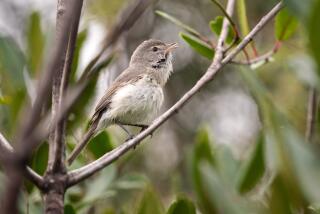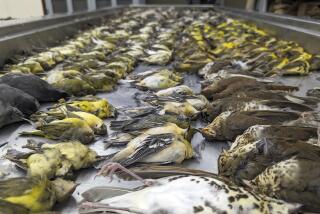Florida cemetery visitor has birdwatchers all aflutter
- Share via
reporting from FORT LAUDERDALE, Fla. — This city’s latest tourist hot spot is a cemetery.
Birders have been flocking to Evergreen Cemetery since a South American bird was spotted here last month, sending online message boards a-twitter.
The variegated flycatcher had been seen just five times before in the U.S. and Canada.
Several hundred people from across the country have traveled to see the bird, which has not been camera-shy.
But its fame stems more from its scarcity than its beauty.
“It doesn’t look spectacular, but just think of how far this bird flew from South America,” said Jacque Woodward, who drove a fair distance herself from near Lake Wales, Fla., to see the bird Tuesday.
Lucie Bruce and Nick Cooney flew in from Texas. They spent parts of Monday and Tuesday at the cemetery, thankful the flycatcher hadn’t been eaten by a hawk or scared away.
“That’s why, when it’s on the Internet, you try to come out as fast as you can,” said Bruce, who is a leading North American birder. The variegated flycatcher makes No. 824 on her list, she said.
The flycatcher is not very colorful. It’s brown on the back, with streaks on its pale-yellow belly. Its tail feathers have reddish-brown edges. And it looks as if it’s wearing a mask.
“It’s just about the rarity,” Bruce said.
The bird is far astray from its typical migratory route, which seldom takes it out of South America.
“It’s lost, and it’s just making a living,” said Billi Wagner, who came from Vero Beach, Fla., to see it.
This is not the first time a rare bird has been spotted in the graveyard.
The South Florida Audubon Society says that the cemetery is a “magnet for migrating birds” and that it has been visited by the very rare rufous and Allen’s hummingbirds and the sulphur-bellied flycatcher.
The society’s Russ Titus was leading a field trip to some of the city’s best bird-watching areas when he saw the variegated flycatcher emerge.
“The bird popped out of a fig tree and was eating berries,” Titus said. “It’s really distinctive,” and it took just a few minutes to identify it.
Titus hopes the bird likes the cemetery and stays awhile.
One variegated flycatcher spotted in Toronto in 1993 stayed a month, he said, but another in Jacksonville, Fla., in 2013 was gone in less than an hour.
“We have already put the sighting on our website, so birdwatchers everywhere know they don’t have to go to South America to see that bird,” said Nicki Grossman of the Greater Fort Lauderdale Convention & Visitors Bureau.
“Hopefully, it’ll find a reason to stay.”
More to Read
Sign up for Essential California
The most important California stories and recommendations in your inbox every morning.
You may occasionally receive promotional content from the Los Angeles Times.










